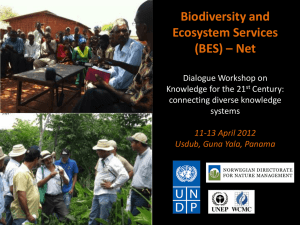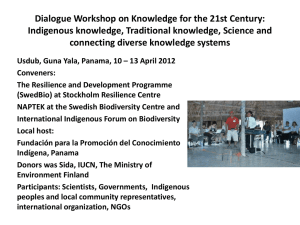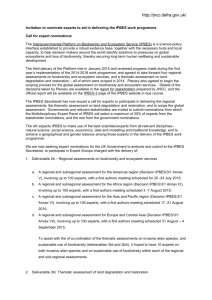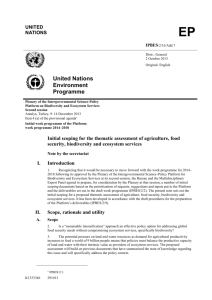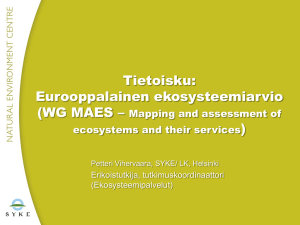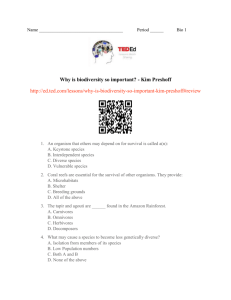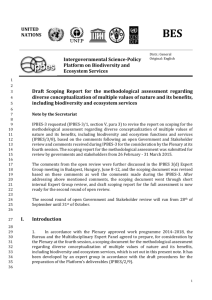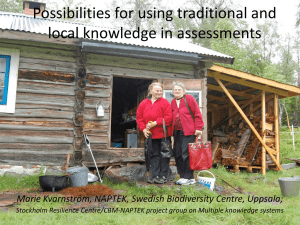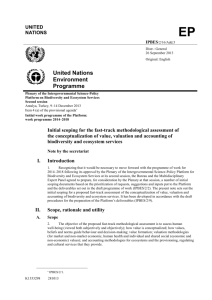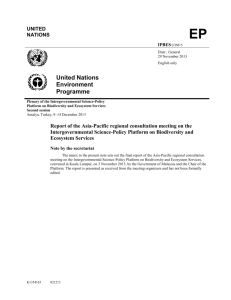IPBES_2_INF_8
advertisement
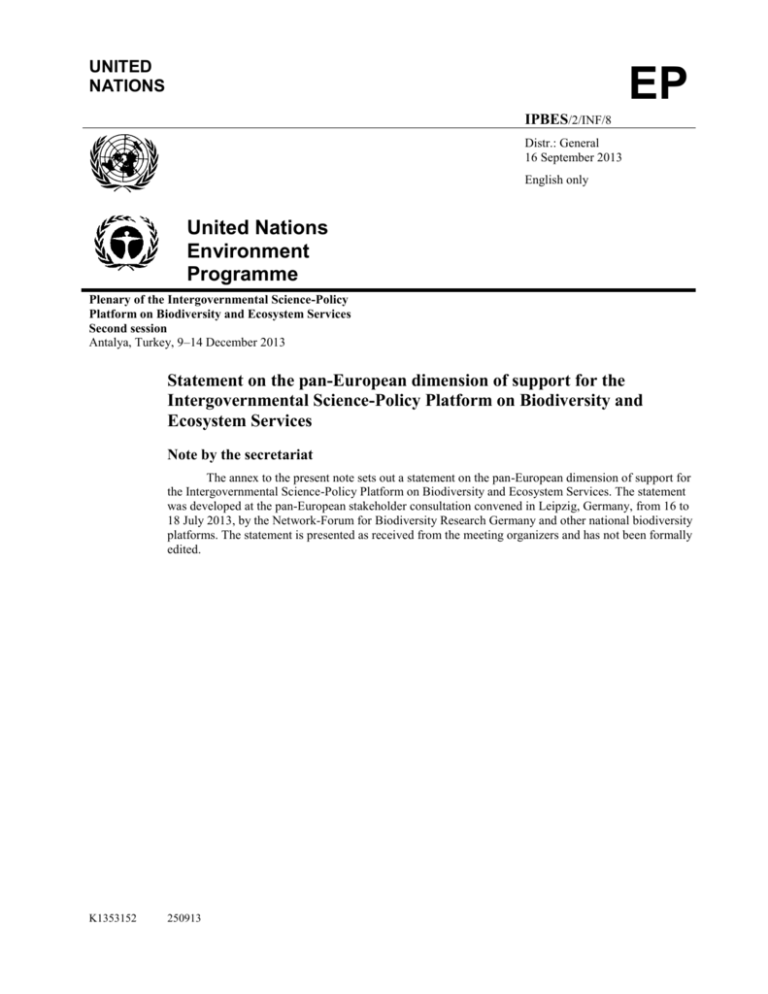
UNITED NATIONS EP IPBES/2/INF/8 Distr.: General 16 September 2013 English only United Nations Environment Programme Plenary of the Intergovernmental Science-Policy Platform on Biodiversity and Ecosystem Services Second session Antalya, Turkey, 9–14 December 2013 Statement on the pan-European dimension of support for the Intergovernmental Science-Policy Platform on Biodiversity and Ecosystem Services Note by the secretariat The annex to the present note sets out a statement on the pan-European dimension of support for the Intergovernmental Science-Policy Platform on Biodiversity and Ecosystem Services. The statement was developed at the pan-European stakeholder consultation convened in Leipzig, Germany, from 16 to 18 July 2013, by the Network-Forum for Biodiversity Research Germany and other national biodiversity platforms. The statement is presented as received from the meeting organizers and has not been formally edited. K1353152 250913 IPBES/2/INF/8 Annex STATEMENT on the pan-European dimension of IPBES support developed during the Pan-European stakeholder consultation to support the intersessional process of IPBES, Leipzig, Germany, July 16–18, 2013* Preamble The participants of the Pan-European stakeholder consultation welcome the progress made in the intersessional process of IPBES in 2013 with the release of major draft documents, including the draft work programme for IPBES 2014-2018. Besides the added-value of an operational IPBES for the global scale, the participants specifically see great potential in IPBES to support the dialogue between decision making and knowledge holders on biodiversity, ecosystem services and human well-being on the panEuropean scale, its sub-regions, countries and even on the local scale, thus creating a cascade effect of better interfacing within society on IPBES activities. Europe, with its diversity of histories and cultural traditions and heritage, policy and knowledge production, its diverse ecosystems, abundance of knowledge holders, and multiplicity of policy strategies and approaches offers great potential to significantly contribute to, and profit from, IPBES. In addition, IPBES may help to highlight the different changes in biodiversity and ecosystem services that are currently happening, as well as future challenges, in different parts of Europe. An integrative stakeholder perspective described in the draft stakeholder engagement strategy of IPBES will be crucial in this respect. The following considerations should be taken into account when further discussing and developing the European dimension of IPBES support. Reflecting the societal needs and challenges of the pan-European context Worldwide, pan-Europe directly impacts biodiversity, ecosystem services and human well-being and “exports” the current production and consumption model that prevails in some of its countries1. In turn, pan-European biodiversity and ecosystems services are also influenced by global changes. The components of the underlying model need to be explicitly addressed in the pan-European work for IPBES in order to ensure relevance of this work for European societies. This includes identifying and addressing the diversity of societal needs, perceptions, responsibilities, values and well-being of all European citizens, and referring to the drivers of production and consumption. This may include an assessment of impacts of Europe on other parts of the world 2. Taking an ecological, rather than a political perspective Biodiversity and ecosystem services exist and operate across political boundaries at various scales. Accordingly, an ecological perspective3, based on natural variability, should be given priority for any IPBES assessment. This is especially relevant for pan-Europe with its high diversity of ecosystems and the ways in which natural capital is utilized through different management regimes. Assessments should also inevitably take into account marine ecosystems as well as overseas territories. 1 this is exemplified by the current approaches of energy consumption, food production, mining, tourism and transportation to name just some of the major challenges 2 Apporaches to be used here could include meta-analysis4 approaches using a) the footprint approach, b) the planetary boundaries concept, c) life cycle assessments and similar approaches 3 Such an approach may make use the Ecosystem Approach of the Convention of Biological Diversity, or the bio-geographical approach used by the EEA and the Council of Europe 2 IPBES/2/INF/8 Using and supporting already existing structures, networks and programmes The pan-European region has the capacity to build upon existing structures, networks and programmes to effectively contribute to regional and sub-regional activities of IPBES. Many of these existing networks are based on strong national and/ or sub-regional capacities and structures, e.g. national biodiversity platforms. They should be brought together in a consultative and participative manner with an inclusive approach. Specific IPBES deliverables, for example the proposed regional assessments, may benefit from additional coordinating activities at the pan-European scale. In any case, partnerships across countries and subregions in Europe should be recognized and the use of their expertise encouraged and supported. Strengths of pan-Europe for supporting the work of IPBES Europe can contribute to IPBES thanks to its multiple assets, which include: strong expertise from a diversity of disciplines, historical experience and information systems on the relation between land and sea use, biodiversity, ecosystem structure and function, and ecosystem services; strong expertise in streamlining and standardization of databases, encouraging initiatives to increase data collection, improve accessibility, and ensure quality and interoperability, which could be used provide models and tools to others; broad knowledge about biodiversity, ecosystem structure and function, and ecosystem services outside Europe4, which should be made accessible for IPBES activities in the according regions; experience in conducting environmental assessments at different levels and on different topics; long-lasting culture of dialogue and compromise and skills at mediating between multiple actors with potentially overlapping or contradicting impacts; collaborative management across boundaries; strong civil society active in the field of biodiversity and ecosystem services; high level of environmental awareness and education; existing corporate and consumer social responsibility; and global experiences in partnerships and capacity building activities. The added value that Europe will get from IPBES: In serving its four functions in a credible and integrated way, IPBES will support decision-making across Europe by: 4 getting stronger evidence on challenges in Europe and its sub-regions with regard to biodiversity ecosystem structure and function, and ecosystem services; increasing awareness of the links between biodiversity, ecosystem services and human well-being; providing options for improvement of policies and their implementation, including the identification of potential trans-boundary activities; helping to include innovative mind-sets and best practices from other regions of the world; creating incentives for more efficient coordination of and access to knowledge at European and national levels; and including European outermost regions and overseas territories 3 IPBES/2/INF/8 highlighting the link to global multilateral environmental agreements like the Convention on Biological Diversity and its Aichi targets and the importance of their implementation in Europe. In order to deliver this, some major requirements will need to be addressed, in order to ensure that expectations on IPBES in pan-Europe can be met and that IPBES links up with, rather than gets into competition with existing institutions: Capacity building is still needed in all parts of Europe to enable experts to efficiently contribute to and stakeholders to get involved in IPBES processes, which may include setting up national support platform on IPBES in countries where they don’t exist yet. Some of the existing structures, networks and programmes that already exist in Europe which can act as major contributors to IPBES activities and success will need to be identified and sustained to ensure long term contribution. Strategies will need to be developed and implemented to engage underrepresented stakeholder groups with IPBES processes on the global and European scale, especially those from land- and sea-use based communities and the private sector. An evaluation process might be set up to assess not only the performance of pan-Europe in IPBES but also assess the impacts and satisfaction with these activities. Taking all these consideration into account, the participants of the conference strongly support the development of a continuous stakeholder engagement process at the pan-European scale beyond the UN-regions which form the basis of IPBES governance. --------------------------* Note on the process to develop this document: Upon proposal by the IPBES interim secretariat, the national biodiversity platforms of Germany, Belgium and France with additional funding support from Switzerland, the U.K. and Germany invited to a pan-European stakeholder conference to support the intersessional process of IPBES in Leipzig, Germany 16th to 18th of July, 2013. About 80 participants from 29 countries attended, including experts from ministries and national and European public organisations, NGOs and civil society organisations, and science. At the meeting, besides discussing draft documents of the online-consultation of IPBES, participants also discussed the pan-European dimension of IPBES in a brainstorming session and a one-day break-out group aiming to identify major issues for the pan-European dimension of IPBES. The resulting draft document was then discussed in a plenary meeting on the next day, consolidated accordingly, and finalized after an additional round of email consultation with all participants after the conference. The document thus reflects an integrative view of the participants based on their personal expertise. For further information on the conference, see: http://www.biodiversity.de/index.php/de/ipbes/ nefo-aktivitaeten-zu-ipbes/workshops/3693-pan-european-stakeholder-consultation-conference 4
